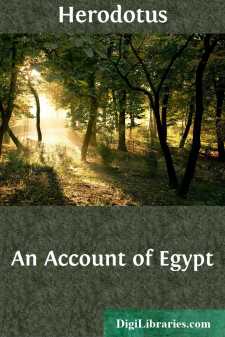Categories
- Antiques & Collectibles 13
- Architecture 36
- Art 48
- Bibles 22
- Biography & Autobiography 813
- Body, Mind & Spirit 142
- Business & Economics 28
- Children's Books 17
- Children's Fiction 14
- Computers 4
- Cooking 94
- Crafts & Hobbies 4
- Drama 346
- Education 46
- Family & Relationships 57
- Fiction 11829
- Games 19
- Gardening 17
- Health & Fitness 34
- History 1377
- House & Home 1
- Humor 147
- Juvenile Fiction 1873
- Juvenile Nonfiction 202
- Language Arts & Disciplines 88
- Law 16
- Literary Collections 686
- Literary Criticism 179
- Mathematics 13
- Medical 41
- Music 40
- Nature 179
- Non-Classifiable 1768
- Performing Arts 7
- Periodicals 1453
- Philosophy 64
- Photography 2
- Poetry 896
- Political Science 203
- Psychology 42
- Reference 154
- Religion 513
- Science 126
- Self-Help 84
- Social Science 81
- Sports & Recreation 34
- Study Aids 3
- Technology & Engineering 59
- Transportation 23
- Travel 463
- True Crime 29
An Account of Egypt
by: Herodotus
Description:
Excerpt
BEING THE SECOND BOOK OF HIS HISTORIES CALLED EUTERPE
When Cyrus had brought his life to an end, Cambyses received the royal power in succession, being the son of Cyrus and of Cassandane the daughter of Pharnaspes, for whose death, which came about before his own, Cyrus had made great mourning himself and also had proclaimed to all those over whom he bore rule that they should make mourning for her: Cambyses, I say, being the son of this woman and of Cyrus, regarded the Ionians and Aiolians as slaves inherited from his father; and he proceeded to march an army against Egypt, taking with him as helpers not only other nations of which he was ruler, but also those of the Hellenes over whom he had power besides.
Now the Egyptians, before the time when Psammetichos became king over them, were wont to suppose that they had come into being first of all men; but since the time when Psammetichos having become king desired to know what men had come into being first, they suppose that the Phrygians came into being before themselves, but they themselves before all other men. Now Psammetichos, when he was not able by inquiry to find out any means of knowing who had come into being first of all men, contrived a device of the following kind:—Taking two newborn children belonging to persons of the common sort he gave them to a shepherd to bring up at the place where his flocks were, with a manner of bringing up such as I shall say, charging him namely that no man should utter any word in their presence, and that they should be placed by themselves in a room where none might come, and at the proper time he should bring them she-goats, and when he had satisfied them with milk he should do for them whatever else was needed. These things Psammetichos did and gave him this charge wishing to hear what word the children would let break forth first after they had ceased from wailings without sense. And accordingly it came to pass; for after a space of two years had gone by, during which the shepherd went on acting so, at length, when he opened the door and entered, both children fell before him in entreaty and uttered the word bekos, stretching forth their hands. At first when he heard this the shepherd kept silence; but since this word was often repeated, as he visited them constantly and attended to them, at last he declared the matter to his master, and at his command he brought the children before his face. Then Psammetichos having himself also heard it, began to inquire what nation of men named anything bekos, and inquiring he found that the Phrygians had this name for bread. In this manner and guided by an indication such as this, the Egyptians were brought to allow that the Phrygians were a more ancient people than themselves. That so it came to pass I heard from the priests of that Hephaistos who dwells at Memphis; but the Hellenes relate, besides many other idle tales, that Psammetichos cut out the tongues of certain women and then caused the children to live with these women.
With regard then to the rearing of the children they related so much as I have said: and I heard also other things at Memphis when I had speech with the priests of Hephaistos....




